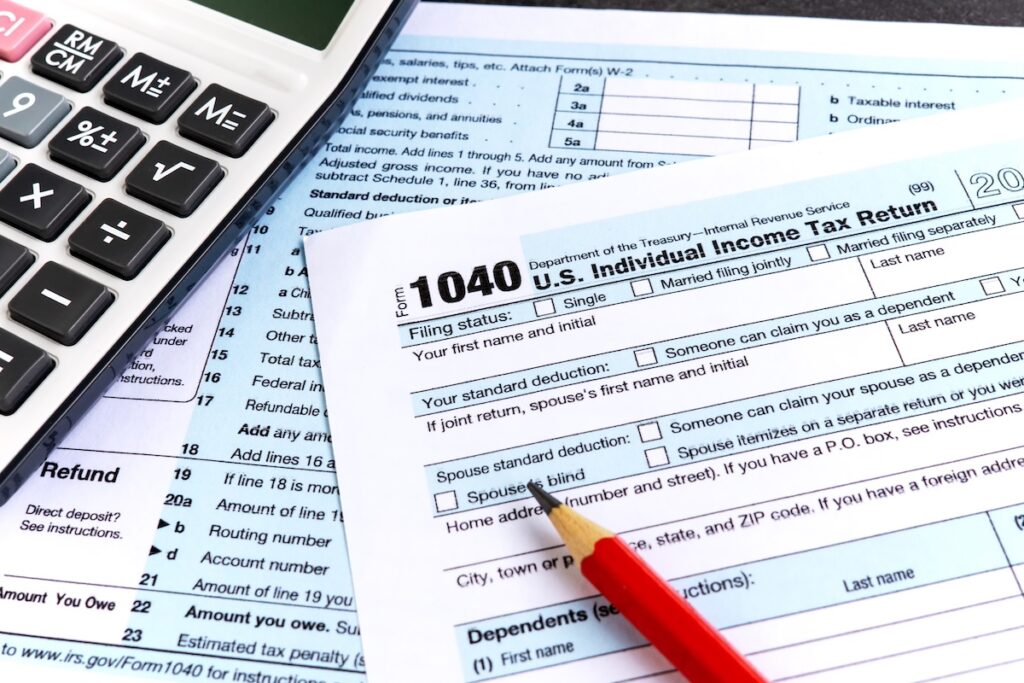A Guide to Filing Virginia State Taxes as a US Expat
October 30, 2025 | State Taxes | 11 minute read
Expat Tax Blog. Tax Tips for US Americans abroad.
Updated
 All blogs are verified by Enrolled Agents and CPAs
All blogs are verified by Enrolled Agents and CPAs
Updated

Federal taxes are an obligation for all US citizens and Green Card holders, regardless of where they live, but what about state taxes? For Virginia residents, the answer depends on whether you’ve entirely cut ties with the state. Known as a “sticky state,” Virginia makes it more difficult for former residents to change their residency and end their state tax obligations. If you keep a home, financial accounts, or strong connections in Virginia, the state may still consider you a resident for tax purposes and require you to file a Virginia state return.
If you’re a former resident of Virginia living abroad, here’s what you need to know about your state tax obligations.
Virginia at a Glance
- Capital: Richmond
- Population: 8.8 million
- State Income Tax: Yes – progressive rates from 2% to 5.75%
- Filing Threshold: $11,950 for single filers; $23,900 for joint filers (2025)
- Tax Year: January 1 – December 31
- Annual State Return: Form 760 (residents), Form 763 (nonresidents), Form 760PY (part-year residents)
- Filing Deadline: May 1 (expats get an automatic extension to July 1; all taxpayers have an automatic six-month extension to November 1)
- Tax Authority: Virginia Department of Taxation
Understanding Residency Rules in Virginia
Virginia determines residency for tax purposes based on both your physical presence and your intent to maintain a permanent home in the state. There are three types of residency for Virginia tax purposes: resident, part-year resident, and nonresident. Each category affects how your income is taxed, so it’s important to know which one applies to you.
Domicile Rules for Virginia Residents Abroad
In Virginia, domicile refers to your true, fixed, and permanent home, the place you intend to return to even after living elsewhere. You may still be considered domiciled in Virginia if you live abroad or in another state but maintain significant ties, such as:
- A Virginia driver’s license or voter registration
- Ownership of a home or rental property in the state
- Dependents enrolled in Virginia schools
- A Virginia mailing address or financial accounts
- Having a business registered in Virginia
To fully end your Virginia residency, you generally need to cut these ties and establish a new permanent residence elsewhere, whether in another state or abroad. Otherwise, Virginia may continue to treat you as a full-year resident and tax you on your worldwide income.
That said, state residency isn’t always black and white. Simply keeping a Virginia driver’s license or voter registration doesn’t automatically make you a Virginia tax resident. The state looks at your overall intent and connections, not just one factor, when determining your domicile.
What Is a “Sticky State”?
A “sticky state” is a state that makes it especially difficult for former residents to cut tax ties after moving away. Even if you’ve relocated abroad or to another state, maintaining certain connections, like a home, mailing address, or driver’s license, can cause the state to still treat you as a resident for tax purposes.
Do You Need to File a State Return in Virginia as an Expat?
Once you understand your residency status, you can determine whether you need to file a Virginia return while living abroad:
Full-Year Residents
If Virginia still considers you a full-year resident, for example, because you live in Virginia, or maintain a place of abode there for more than 183 days during the year, or have strong domicile ties such as financial accounts, driver’s license, or mailing address, you must file a Virginia tax return. Full-year residents are taxed on all worldwide income.
In practice, Virginia looks at the combination of these factors, not any single one, to determine whether you’re still considered a full-year resident for tax purposes.
Part-Year Residents
If you moved into or out of Virginia during the year, you’ll need to file a Virginia return. The state taxes your worldwide income during the months you lived in Virginia, plus any Virginia-sourced income for the rest of the year.
Nonresidents
If you’re classified as a nonresident, meaning you’ve cut Virginia domicile ties, don’t maintain a permanent home in the state, and spent fewer than 183 days there, you only need to file if you have Virginia-sourced income. Common examples include remote work performed for a Virginia employer, rental income from Virginia property, or business income sourced in the state.
The table below summarizes Virginia’s residency classifications and how each status is taxed.
| Residency Status | Definition | How Virginia Taxes Income |
|---|---|---|
| Resident | You live in Virginia, or maintain a place of abode there for more than 183 days during the year, or are domiciled in Virginia. | Virginia taxes all worldwide income. |
| Part-Year Resident | You lived in Virginia for part of the year, either moving in or out of the state. | Virginia taxes income earned while a resident, plus any Virginia-sourced income for the rest of the year. |
| Nonresident | You lived outside Virginia all year, did not maintain a permanent place of abode there, and spent fewer than 183 days in the state. | Virginia taxes only Virginia-sourced income (for example, wages earned in the state, rental income from Virginia property, or business income connected to Virginia). |
Learn more at the Virginia Department of Taxation
Does Virginia Have a State Income Tax?
Yes. Virginia has a progressive state income tax with four brackets ranging from 2% to 5.75%. The higher your income, the higher the percentage you’ll pay. You must generally file a Virginia state return if your Virginia Adjusted Gross Income (VAGI) is at least $11,950 (single) or $23,900 (married filing jointly) in 2025, and you meet residency requirements or have Virginia-sourced income.
For the 2025 tax year, here are Virginia’s state income tax brackets:
| Tax Rate | Income Bracket (Single Filers) |
|---|---|
| 2% | $0 – $3,000 |
| 3% | $3,001 – $5,000 |
| 5% | $5,001 – $17,000 |
| 5.75% | Over $17,000 |
Note: Brackets apply to Virginia taxable income. Thresholds are doubled for married couples filing jointly. For full details, refer to the Virginia Department of Taxation’s official rate schedule.
How Virginia Treats Foreign Income, Exclusions, and Tax Credits
When filing your federal return as a US expat, you may qualify for the Foreign Earned Income Exclusion (FEIE), the Foreign Housing Exclusion, or the Foreign Tax Credit (FTC) to reduce or eliminate double taxation at the federal level.
However, Virginia does not conform to these federal provisions. If you’re considered a Virginia resident (full-year or part-year), your worldwide income is subject to Virginia state tax, even if earned abroad. You cannot:
- Exclude foreign earned income under the FEIE,
- Deduct foreign housing expenses, or
- Claim credits for taxes paid to a foreign country.
The only credit Virginia allows is for taxes paid to another US state on the same income. This means your income could effectively be taxed twice, once by your country of residence and again by Virginia, if you haven’t formally ended your Virginia residency.
Other Considerations
Virginia also taxes common types of income at the same progressive rates as wages, including:
- Rental income from property (whether in Virginia or abroad).
- Capital gains and investment income.
- Retirement income (pensions, IRAs, annuities), with some exemptions depending on your Adjusted Gross Income (AGI).
Social Security benefits are not taxed in Virginia, and seniors may deduct up to $12,000 in other qualifying retirement income.
Virginia State-Specific Forms You May Need
Just like you file Form 1040 at the federal level, Virginia has its own state income tax return forms:
- Form 760 – For full-year residents
- Form 760PY – For part-year residents
- Form 763 – For nonresidents
Using the correct form based on your residency status ensures you file accurately and avoid delays or errors in processing.
Virginia State Tax Filing Deadlines and Extensions
Virginia state income tax returns are due May 1, slightly later than the federal filing deadline.
If you’re a US expat, you automatically receive a two-month extension to July 1. If you still need more time, Virginia also grants an automatic six-month extension to November 1.
Keep in mind that extensions only apply to filing, not payment. At least 90% of your total Virginia tax liability owed must still be paid by May 1 to avoid penalties and interest.
If you can’t file on time but wish to make a payment to avoid interest and late fees, you can use Form 760IP (Automatic Extension Payment) to estimate and submit your payment by the original due date. Even for expats who receive an automatic two-month filing extension to July 1, any taxes owed must still be paid by May 1 to avoid penalties and interest.
Penalties for Not Filing
Failing to file Virginia state taxes can lead to penalties, interest charges, and enforcement actions by the Virginia Department of Taxation, even if you live abroad. Virginia is known for actively pursuing taxpayers with overdue balances, and can assess fines and interest on unpaid taxes until the balance is fully paid.
| Violation | Penalty |
|---|---|
| Failure to File | 6% of unpaid tax per month, up to 30% |
| Late Payment | 6% of unpaid tax per month, up to 30% (not applied during extension period) |
| Extension Penalty | 2% per month on balance due, up to 12% |
| Interest on Unpaid Tax | Accrues daily at the federal underpayment rate + 2% until paid in full |
| Failure to Pay Electronically (if required) | 2% of the amount due, up to $500 |
For more information, visit the Virginia Department of Taxation’s Penalties and Interest page
Penalty Waiver
If extenuating circumstances kept you from filing or paying on time, Virginia may waive penalties of $2,000 or less (but not interest) if you show reasonable cause, such as relocation delays, illness, or other extenuating circumstances.
For penalties over $2,000, you can apply for an Offer in Compromise to request relief: Virginia Tax – Offer in Compromise.
How to Sever Ties with Virginia and Avoid Future Tax Liabilities
If you’ve moved abroad and want to ensure Virginia no longer considers you a resident for tax purposes, you must demonstrate that you’ve severed your ties with the state. Virginia taxes full-year residents on worldwide income, so unless you take steps to end residency, the state may continue to treat you as domiciled.
Steps to Sever Residency:
- Surrender your Virginia driver’s license (and obtain a new one in your new country of residence, if possible).
- Sell or lease out any property in Virginia so you no longer maintain a permanent home there.
- Move your banking and mailing address abroad to show a permanent shift in your financial and personal connections.
Establishing Foreign Residency:
It’s not enough just to leave the state; you must also prove you’ve established residency elsewhere. Showing ties such as foreign property, local bank accounts, and residency permits strengthens your case and helps prevent Virginia from classifying you as a resident for tax purposes.
States Without Income Taxes
Some states don’t impose an income tax at all. If you’re domiciled in one of these states, you typically won’t have to file a state return while living abroad:
- Alaska
- Florida
- Nevada
- South Dakota
- Tennessee
- Texas
- Wyoming
- Washington
- New Hampshire (as of January 1, 2025, when its Interest & Dividends Tax is fully repealed)
If you’re planning a long-term move abroad, consider establishing domicile in a state without income tax. For expats, this can simplify things significantly.
However, if you maintain ties to states that do impose an income tax, like California, New York, Connecticut, or Virginia you could still be required to file and pay state taxes even while abroad.
Always confirm with your state’s Department of Revenue before assuming you’re exempt.
File It All at Once With MyExpatTaxes
Filing from abroad can feel overwhelming when you’re juggling both federal and state requirements. Virginia, in particular, is known for its strict domicile rules and continued taxation of residents on worldwide income, meaning expats can’t afford to miss deadlines or overlook their state obligations. With MyExpatTaxes, you don’t have to juggle separate filings. Our software makes it simple to file your federal and Virginia state returns together in one streamlined process.
Whether you’re still considered a Virginia resident, moved out mid-year, or need to prove nonresident status, MyExpatTaxes helps ensure every detail is handled correctly. And if your situation is more complex, our tax professionals are available to guide you through the rules so you can file with confidence.
Frequently Asked Questions
Content of the Accordion Panel
Yes, it depends on your residency and where your income is sourced. Full-year residents (based on domicile or maintaining a place of abode in Virginia for more than 183 days) and part-year residents must pay Virginia tax on worldwide income during their period of residency.
Content of the Accordion Panel
Your domicile is your true, fixed, and permanent home, the place you intend to return to, even after living elsewhere. Virginia may still consider you domiciled if you maintain ties such as a home, driver’s license, financial accounts, or a mailing address in the state.
Content of the Accordion Panel
No. Unlike federal rules, Virginia does not recognize the FEIE, housing deductions, or credits for foreign taxes paid. However, the state may grant a credit for income taxes paid to another US state or territory on the same income.
Content of the Accordion Panel
Full-year residents file Form 760, while part-year residents use Form 760PY and nonresidents file Form 763. Using the correct form ensures your residency status and income sources are reported accurately.
Content of the Accordion Panel
Virginia’s state tax deadline is May 1, with an automatic two-month extension to July 1 for expats living abroad. An additional six-month extension (to November 1) is also available. However, any taxes owed must be paid by May 1 to avoid interest and penalties.
Content of the Accordion Panel
Virginia actively enforces compliance and can assess penalties and interest for unpaid or late-filed returns, even for residents living overseas.
Content of the Accordion Panel
Yes, if you have Virginia-sourced income, such as wages from a Virginia employer, rental income from Virginia property, or business income tied to the state. Nonresidents file using Form 763.
See Why US Expats From Around the World Love Us!
Easily file regardless of how complex your US expat tax situation is.
Been here before? Sign in!


Written by Nathalie Goldstein, EA
Nathalie Goldstein, EA is a leading expert on US taxes for Americans living abroad and CEO and Co-Founder of MyExpatTaxes. She contributes to Forbes and has been featured in Forbes, CNBC and Yahoo Finance discussing US expat tax.
October 30, 2025 | State Taxes | 11 minute read







